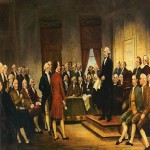PART III _ Is it possible that much of the current global social inequalities were set in motion by choice and not chance? Could the roots of social inequality and economic disparity be woven into the founding beliefs, financial systems, and governing bodies of many developed nations?
Take the United States as an example. Written in 1787, the United States Constitution is the world's longest-running written government charter and is still the source of legal authority in the U.S. today.
The Framers of the U.S. Constitution may have been intellectual men of their time, but they were not infallible. Their concepts of establishing and governing a new nation were inevitably influenced and limited by their own life experiences, perspectives, and likely their aspirations to both safeguard and expand their own power and privileges.
Systems Based on Hard Determinism
We tend to view the U.S. Constitution as having been written with the full blessing and approval of "the people." However, this may not have been the case. In his book, Toward an American Revolution: Exposing the Constitution and Other Illusions, author Jerry Fresia explains:
“When the Constitution was completed, the majority of the people were completely against it. The majority instead identified with the document, which was the Constitution from 1781 to 1789, the Articles of Confederation.”
Fresia also suggests that while there was a consensus among different classes that the Articles required amendments to be strengthened, the men who would become the Framers of the Constitution intended to restructure the government entirely.
According to Fresia, the Framers were concerned that “men of more humble, more rural origins, less educated, and with more parochial interests” had too much political influence. As such, “Gentlemen of property” too frequently lost electoral contests to men from the “lower classes.”
The Framers believed, paraphrasing John Locke, that “having more in proportion than the rest of the World, or than our Neighbours, whereby we are enabled to procure to ourselves a greater Plenty of the Conveniences of Life” should be the aim. This makes sense, given that the Framers of the U.S. Constitution were among the wealthiest people in the Colonies.
Many of the Framers were either born into or married into leading families. Most were landowners with substantial holdings. They were also a well-educated group, as many attended top universities within the colonies or abroad and more than half were lawyers. And they represented positions of power as several Framers were government officials, merchants, and businessmen who wanted independence or freedom from the Crown and the Church to run their businesses any way they wanted.
These men wished to secure their governing power and privilege and ensure they would not need to share economic and political power with the less privileged classes.
The Framers also expected that men like them—namely white male landowners with similar or higher levels of education, economic status, and social caliber—should continue to guide and lead the nation. As such, they created a system in which landholding equates to wealth which equates to power. This system persists today.
In her book, White Trash: The 400-Year Untold History of Class in America, Nancy Isenberg explains:
“Land was the principal source of wealth, and those without any had little chance to escape servitude. It was the stigma of landlessness that would leave its mark on ‘white trash’ from this day forward.”
Apart from the inherent caste bias that can be inferred from the way social representation is distributed among the Framers, the crucial question to ask is whether the outcome of this arrangement of minds was intended to prioritize the preservation of wealth and status over truth, justice, and the democratic principles of a government meant to be driven for the people and by the people?
John C. Miller, author of The American Revolution as a Democratic Movement, writes:
“[The Framers]...had no wish to usher in democracy in the United States. They were not making war upon the principle of aristocracy, and they had no more intention than the Tories of destroying the tradition of upper-class leadership in the colonies. Although they hoped to turn the Tories out of office, they did not propose to open these lush pastures to the common herd. They believed, however, that the common people, if properly bridled and reined, might be allies in freeing the colonies from British rule and that they - the gentry - might reap the benefits without interference. In other words, they expected to achieve a "safe and sane" revolution of gentlemen, by gentlemen, and for gentlemen.”
As such, the Framers of the Constitution saw to it that only one part of one branch of the federal government, the House of Representatives, is popularly elected by the people. The Electoral College chooses the president, the commander-in-chief selects the Supreme Court justices, and, initially, senators were chosen by state legislatures.
Bruce Kuklick, a professor of American history emeritus at the University of Pennsylvania noted:
“It's another attempt to kind of whittle away at the direct participation of a large group of people in the political process. So, there are all these other constraints that they write into the Constitution to shore up what they think might be a leaky vessel, where too many ignorant, poor people get the right to vote.”
Given the number of U.S. presidents who have attended Ivy League universities and have been independently wealthy, perhaps the Framers’ aim of reserving a prominent place in government for a particular class and status of men has been realized.
If that is the case, what is ahead for the future of America?
In his book, Capital in the Twenty-First Century, French economist Thomas Piketty asserts that:
"...extremely high levels of wealth inequality are incompatible with the meritocratic values and principles of social justice fundamental to modern democratic societies." Additionally, "the risk of a drift towards oligarchy is real and gives little reason for optimism about where the United States is headed."
Systems that Nurture Endemic Bias
Most of the Framers of the U.S. Constitution had taken up arms (and, in some cases, put down money) to free themselves from the tyrannical rule of the British monarchy. Yet, at the same time, many were either directly or indirectly involved in and profiting from human trafficking and the enslavement of black people.
This contradiction raises questions about the Framer's ability to establish fair and just laws for all. Alternatively, one might wonder if they effectively invalidated their authority by engaging in actions that today are widely recognized as among the most morally, ethically, and justly reprehensible acts in the history of humanity, fundamentally contradicting principles of justice, fairness, and equality.
Brian Price, an American historian who has spent countless hours studying early American elites' rise to power, poses a similar question:
"Is it possible for a class which exterminates the native peoples of the Americas, replaces them by raping Africa for humans it then denigrates and dehumanizes as slaves, while cheapening and degrading its working class - is it possible for such a class to create democracy, equality, and to advance the cause of human freedom?" The implicit answer is, "No. Of course not."
There is a jarring contradiction between the framers’ complaints about oppression and their participation in chattel slavery. It seems that the framers were not working for the freedom of all but for that of white male colonists.
“Jefferson and the other founders were keenly aware of this hypocrisy... Yet neither Jefferson nor most of the founders intended to abolish slavery... There is no mention of slavery in the final Declaration of Independence. Similarly, when it came time to draft the Constitution, the framers carefully constructed a document that preserved and protected slavery without ever using the word.” – The New York Times, 1619 Project.
This was made possible by denying enslaved people their “unalienable Rights” and classifying them as property that could be traded as goods. According to historian David Waldstreicher, six clauses within the U.S. Constitution deal directly with enslaved people and their enslavement, and at least five more hold implications for slavery.
The Constitution protected the “property” of those who enslaved black people, prohibited the federal government from intervening to end the importation of enslaved Africans for a term of 20 years, allowed Congress to mobilize the militia to put down insurrections by the enslaved, and forced states that had outlawed slavery to turn over enslaved people who had run away seeking refuge.
Writer and abolitionist Samuel Bryan called out the deceit, saying of the Constitution:
"The words are dark and ambiguous; such as no plain man of common sense would have used, [and] are chosen to conceal from Europe, that in this enlightened country, the practice of slavery has its advocates among men in the highest stations."
Later, the Framers ratified 12 amendments to the Constitution, including the Bill of Rights, which was meant to—among other things—guarantee civil rights and liberties to the individual. Yet, slavery was still an acceptable practice. Because enslaved people were considered property, they were not recognized as humans worthy of or requiring civil rights and liberties.
Eventually, the 13th Amendment did abolish the industry of human trafficking and enslavement in the U.S. However, it did little to abolish the embedded mindset of racial division and inequality that centuries of slavery had brought about. Nor did it repair the health and wealth gap that slavery created and fueled.
Quite the opposite, post-slavery policies, practices, and actions included sharecropping, segregation, racial violence, Jim Crow laws, and other outright discriminatory practices that contributed to the ongoing deprivation and poverty of previously enslaved black people in the U.S.
The physical, emotional, and economic burdens of slavery still impact culture and society in the U.S. today.
“American slavery is necessarily imprinted on the DNA of American capitalism...”
Nancy Isenburg calls out the system more bluntly:
"Poor whites are still taught to hate—but not to hate those who are keeping them in line. Lyndon Johnson knew this when he quipped, "If you can convince the lowest white man he's better than the best-colored man, he won't notice you're picking his pocket. Hell, give him somebody to look down on, and he'll empty his pockets for you."
Should the U.S. continue to depend upon or live by the concepts of justice articulated by wealthy and powerful white men—many of whom were enslavers—who lived almost three centuries ago?
If the government of the United States does not, in its policies, express the voice or protect the general welfare of the people, does it lack legitimacy?
Systems Void of Moral Consciousness
Attaining happiness has always been a fundamental human aspiration, but what does it mean to be happy?
There is no universal definition of happiness. People around the world define happiness and well-being differently, and a person's interpretation of happiness may depend on their culture and society. For example, when asked about happiness, people in Japan alluded to social harmony. Meanwhile, Hong Kong Chinese people define happiness through positive low arousal states such as calm and relaxation. And for Indigenous Americans, happiness is connected to a deep sense of belonging and satisfaction from the collective support of family and community ties.
In the eyes of many developed nations, the evidence of happiness is tied to national output, namely the gross domestic product (GDP). Policymakers and economists in these countries often treat GDP as an all-encompassing unit to signify a nation's development, combining its economic prosperity and societal well-being. As a result, policies that result in economic growth are believed to benefit society.
However, GDP is not a sound measure of general welfare or successful economies.
Focusing on GDP and economic gain ignores the adverse effects of unbridled economic growth on society, such as climate change, income inequality, lower quality of life, and more.
Additionally, at some point, no amount of financial gain or acquisition will have the ability to increase happiness. Likewise, low income does not necessarily preclude happiness.
As such, some nations are expanding their view and measurement of national happiness.
For example, Bhutan, a Buddhist kingdom on the Himalayas' eastern edge, measures Gross National Happiness (GNH). To the Bhutanese, this measure is considerably more important than the country's GDP, and the country's Constitution even states that all development policies should ultimately increase the GNH.
Researchers working on the World Happiness Report say that most people’s happiness is driven by strong economic growth coupled with healthy life expectancy, trust, generosity, quality social relationships, and the freedom to live and work as they prefer.
As Dan Buettner, writing on “The Search for Happiness” for the National Geographic points out, these factors don’t materialize by chance. “They are intimately connected to a country’s government and cultural values. In other words, the happiest places incubate happiness for their people.”
So, what does happiness mean according to the U.S. government and cultural values?
The opening lines of the Declaration of Independence—which Thomas Jefferson drafted—assert that,
“We hold these truths to be self-evident, that all men are created equal, that they are endowed by their Creator with certain unalienable Rights, that among these are Life, Liberty and the pursuit of Happiness.”
There is plenty of discussion and evidence—including by the Thomas Jefferson Foundation, Inc.—which suggests that this wording was almost certainly influenced by George Mason's Virginia Declaration of Rights (adopted June 12, 1776), which referred to "the enjoyment of life and liberty, with the means of acquiring and possessing property, and pursuing and obtaining happiness and safety."
This ideology links possessing the resources and capability to acquire land with a fulfilling life. This belief, coupled with the lucrative business of human trafficking and enslavement, led to a starkly uneven playing field in the U.S. wherein:
1. The wealthy could relentlessly pursue personal fortunes without feeling morally accountable, exploiting enslaved people and the environment.
2. Poor white workers, observing the plight of enslaved individuals, realized that their circumstances could be far worse and, as a result, generally accepted their positions in society.
Perhaps unsurprisingly, systems of disparity were familiar concepts within the colonies. The wealthy had become more affluent and the less fortunate had become poorer in the hundred years before the War of Independence. For example, in 1687 in Boston, the top 1% owned about 25% of the wealth. By 1770, the top 1% owned 44% of the wealth.
During this same period, the percentage of adult males who were poor doubled from 14% to 29%. During this time, the wealthy initially introduced property qualifications for voting to disenfranchise the poor and protect their privileges.
These systems established the foundation for the rise of private power, corporate greed, and the prevalent focus on profit that characterizes much of the U.S. today. It appears the system was designed to create divisions to gain control, but what have these developments ultimately resulted in?
Are some groups of Americans still deprived of the opportunity to own a measure of happiness? In a world where the pursuit of property and accumulating wealth is prioritized as the ultimate measure of happiness, what impact does this have on the sustainability of our planet? What are the consequences for the environment when such ideals take precedence?
SUMMARY
In many developed nations, governments operate on ideologies of power and control.
The United States Declaration of Independence declared equality and unalienable rights in the Western hemisphere, but the Framers didn't honestly believe in these principles. Instead, they prioritized their interests and wealth, neglecting the rights of enslaved individuals, ethnic minorities, women, and the economically disadvantaged while disregarding the planet's sustainability.
The subsequent U.S. Constitution also discounted racial and ethnic minorities, indigenous people, and the lower-income workforce, indirectly endorsing segregation and exclusionary practices. Similar systems are found in other developed nations, prioritizing certain groups while neglecting others, leading to social unrest and environmental issues like climate change.
Overall, these belief systems harm the welfare of people and the planet and limit economic opportunities within and beyond countries.
On this day in 1787, the U.S. Constitution was signed after being drafted in secret by delegates to the Constitutional Convention that summer. Today, Ready Player Institute asks, should the four-page document—written by a few wealthy, white, landowning slaveholders—which established the government of the United States at that time still hold to this day? Or have we learned anything since then that could help support a more equitable path forward for all?
ABOUT READY PLAYER INSTITUTE
Ready Player Institute is a 501(c)(3) non-profit organization addressing disparities in underserved and vulnerable regions, including LATAM, the Caribbean and Pacific Islands.
Their mission is to foster greater diversity and inclusion within research and entrepreneurship, all while harnessing innovation and technology to drive sustainable solutions.
Your contribution to Ready Player Institute through Uprise will directly support individuals from minority backgrounds in underserved regions. These funds will enable them to access essential training and laboratory programs aimed at digitizing tangible assets, improving educational opportunities, advancing healthcare services, optimizing the food supply chain, and addressing the pressing issue of climate change.
Ready Player Institute collaborates closely with Project DARP, Ready Player Infrastructure, and Ready Player Ventures, forming a comprehensive network dedicated to positive change and innovation.
Your support can make a meaningful difference in their efforts to empower underserved communities and drive progress in these critical areas.
🌍 Join Us in Making a Difference! 🌱
Do you have innovative ideas, breaking news, groundbreaking research, or expert insights that can help tackle climate change, environmental pollution, and social inequity? Share your voice with the world and be a catalyst for positive change. Together, we can create a better future!
Contact us today on publishing@readyplayerinstitute.org.










